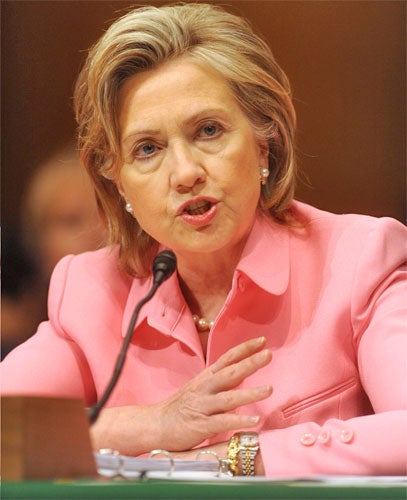Clinton warns UK defence cuts may undermine Nato
US warns 'alliance must be maintained' as Government plan to hit RAF hardest

US Secretary of State Hillary Clinton last night voiced fears that the Coalition Government's determination to slash defence spending may threaten the capabilities of Nato.
Backed by her Defence Secretary Robert Gates, Mrs Clinton went on to suggest that the cutbacks could mean Britain fails in its commitment by falling short of contributing its fair share.
As ministers and the military entered the final stages of deciding which units and projects to axe or cut back, Mrs Clinton was explicit in admitting the spending plans worry her and said: "The reason is because I think we do have to have an alliance where there is a commitment to the common defence.
"Nato has been the most successful alliance for defensive purposes in the history of the world... but it has to be maintained. Each country has to be able to make its appropriate contributions."
Mr Gates, who was in Brussels with the Secretary of State for a Nato meeting, added: "My worry is that the more our allies cut their capabilities, the more people will look to the United States to cover gaps," he said.
Downing Street maintained last night that, "each country has to be able to make its appropriate contribution to common defence in Nato and Britain will always do that".
The Independent learnt last night that the RAF is, of the three services, facing the biggest cuts as a result of the Strategic Defence and Security Review. The heads of the three armed forces, as well as the Chief of Defence Staff, met David Cameron at Downing Street last night to be told the conclusions of the review; the formalities are expected to be tied up today ahead of next week's public announcement.
The total scale of cuts for the Ministry of Defence is believed to be between 7 and 9 per cent, lower than expected. The Defence Secretary, Dr Liam Fox, is considered to have done well in his struggle with the Treasury, but senior civil servants say relations with Downing Street have become frayed.
General Sir Peter Wall, Air Chief Marshal Sir Stephen Dalton, Admiral Sir Mark Stanhope and the head of the military, Air Chief Marshal Sir Jock Stirrup, will have the chance to make final representations.
According to senior defence sources the number of RAF fast jets is expected to be drastically cut. The Navy will get its two aircraft carriers, though one will either be mothballed or used as more of an amphibious vessel; the surface fleet is due to be cut by about four ships.
The Army will lose some armour, including tanks, but its manpower will not be reduced significantly until 2015, when the Afghan mission is due to end.
More unmanned "drone" aircraft will be used, possibly under an integrated tri-service command. Cyber defences and other forms of "electronic" warfare will also be boosted.
The RAF will have fewer US F-35 Joint Strike Fighters, and the Tornado GR4 will be withdrawn earlier than the planned date of 2018. The numbers of Nimrod MRA4 will also be cut and RAF bases may be closed.
Senior officers have privately complained that the spending review has been disorganised and that the Treasury had tried to take over the process.
Join our commenting forum
Join thought-provoking conversations, follow other Independent readers and see their replies
Comments
Bookmark popover
Removed from bookmarks